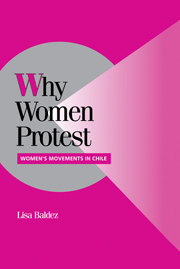Book contents
- Frontmatter
- Contents
- List of Figures and Tables
- Preface
- 1 WHY WOMEN PROTEST: TIPPING, TIMING, AND FRAMING
- 2 MOTHERS OF THE COLD WAR, DAUGHTERS OF THE REVOLUTION: A HISTORICAL OVERVIEW OF WOMEN AND CHILEAN POLITICS
- Part One Women Against Allende
- Part Two Women Against Pinochet
- 6 GENDERED NETWORKS AND THE REBIRTH OF CIVIL SOCIETY
- 7 WOMEN DEFEND LIFE: MASS PROTESTS AND THE WOMEN'S MOVEMENT
- 8 DEMOCRACY IN THE COUNTRY AND IN THE HOME: WOMEN FOR AND AGAINST DEMOCRATIC TRANSITION
- 9 WHY WOMEN PROTEST: COMPARATIVE EVIDENCE
- References
- Index
7 - WOMEN DEFEND LIFE: MASS PROTESTS AND THE WOMEN'S MOVEMENT
Published online by Cambridge University Press: 06 July 2010
- Frontmatter
- Contents
- List of Figures and Tables
- Preface
- 1 WHY WOMEN PROTEST: TIPPING, TIMING, AND FRAMING
- 2 MOTHERS OF THE COLD WAR, DAUGHTERS OF THE REVOLUTION: A HISTORICAL OVERVIEW OF WOMEN AND CHILEAN POLITICS
- Part One Women Against Allende
- Part Two Women Against Pinochet
- 6 GENDERED NETWORKS AND THE REBIRTH OF CIVIL SOCIETY
- 7 WOMEN DEFEND LIFE: MASS PROTESTS AND THE WOMEN'S MOVEMENT
- 8 DEMOCRACY IN THE COUNTRY AND IN THE HOME: WOMEN FOR AND AGAINST DEMOCRATIC TRANSITION
- 9 WHY WOMEN PROTEST: COMPARATIVE EVIDENCE
- References
- Index
Summary
Chileans tend to associate the March of the Empty Pots with the women who mobilized against Allende. During the dictatorship, however, those who opposed the regime, men as well as women, banged on empty pots and pans to demonstrate against Pinochet. The empty pot became a powerful symbol of opposition to the military, just as it had signified opposition to Allende during the Popular Unity (UP) years. The cacerolas sounded again during the Days of National Protest, a series of mass demonstrations against the military regime that took place every month between 1983 and 1986. During these protests, a wide array of organizations representing labor, students, the poor, white-collar professionals, and women took the streets to denounce the regime. The center-left opposition parties embraced mass mobilization as a conscious strategy to overthrow Pinochet. Initially, the fall of the regime seemed imminent, but within a few months, the military had regained control and showed no signs of collapse. Moderate middle-class sectors withdrew their support for the protests as violence escalated in the shantytowns, and divisions within the opposition parties reemerged.
The reappearance of political parties in the public arena marked an important moment in the possibility for democratization. The opposition political parties formed two competing coalitions, the Democratic Alliance (AD) and the Popular Democratic Movement (MDP). The formation of these alliances constituted a moment of political realignment. Yet conflicts between the two coalitions threatened to derail return to civilian rule. In late 1983, the moment at which people believed the prospects for overthrowing Pinochet were high, debates over strategy plagued the opposition parties and prevented them from forming a united front against the dictatorship.
- Type
- Chapter
- Information
- Why Women ProtestWomen's Movements in Chile, pp. 146 - 167Publisher: Cambridge University PressPrint publication year: 2002



